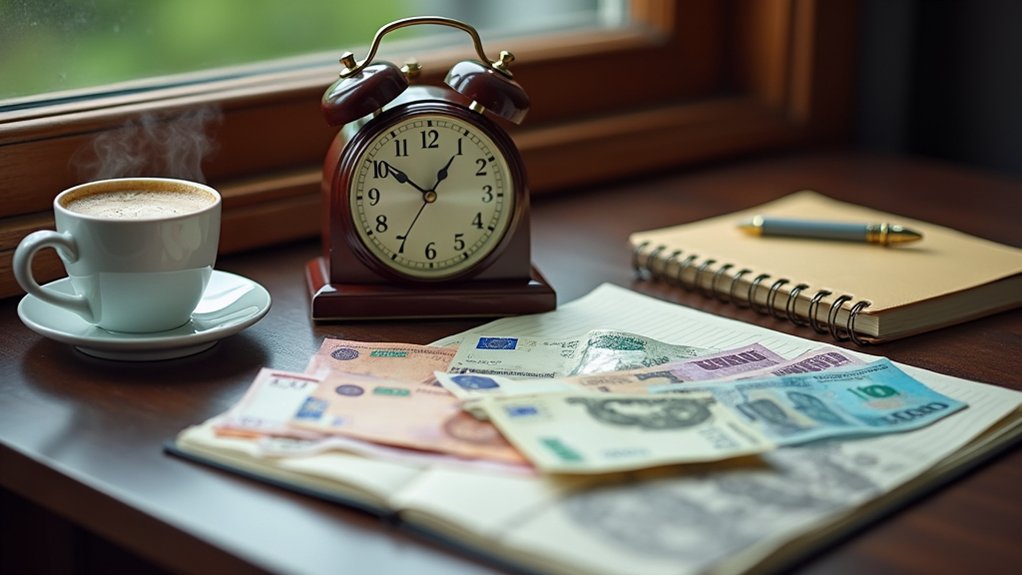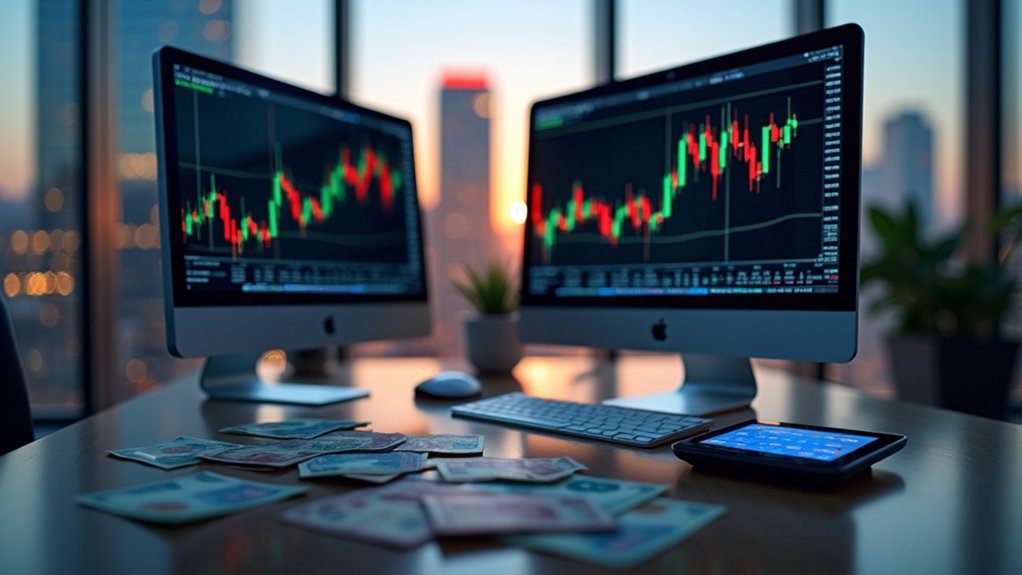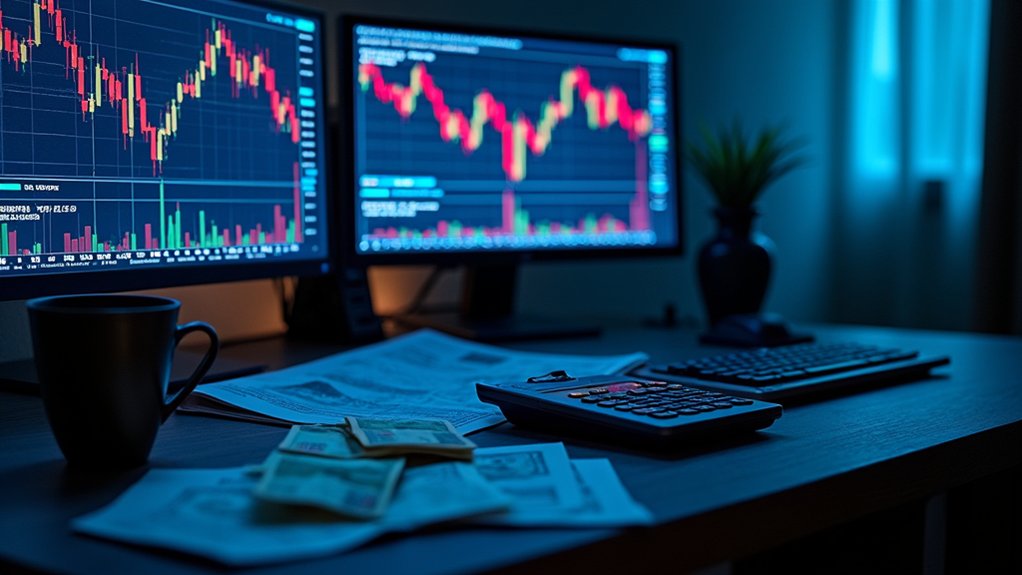Forex trading delivers massive liquidity—$9.6 trillion daily—so trades execute fast with minimal slippage. The market runs 24/5, requires as little as $100 to start, and charges zero commissions at many brokers who profit from spreads instead. Leverage up to 100:1 lets small accounts control huge positions, though losses amplify just as quickly as gains. No gatekeepers, no exchange fees, and short selling is simple. Demo accounts let beginners practice risk-free before going live. The mechanics behind these advantages reveal why millions have jumped in.

Across the continent, from Lagos to Nairobi to Johannesburg, forex trading has become more than just a financial buzzword—it's a daily reality for thousands of traders trying to build wealth in markets that don't sleep.
Forex trading has evolved from financial jargon into a tangible wealth-building tool for thousands of African traders across major cities.
The numbers tell part of the story. Daily global forex trading volume hit $9.6 trillion in April 2025. That's trillion with a T. This massive liquidity means African traders can execute trades immediately, without the slippage that plagues smaller markets. When a Nigerian trader wants to move on breaking news about the naira, the market absorbs it. No waiting. No drama.
Then there's leverage. Brokers operating across Africa offer ratios up to 100:1 on certain account types. A Kenyan trader with $1,000 can control a $100,000 position. That's the appeal. Small price movements suddenly matter. But here's the blunt part—leverage amplifies losses just as fast as profits. The same tool that builds accounts also wipes them out.
Access is democratized in ways older markets never were. The forex market runs 24 hours, five days a week. A trader in Accra can start with $100 and an internet connection. No exchange membership. No gatekeepers. Just a laptop and willingness to learn. That low barrier has brought thousands of Africans into trading who would've been locked out of stock exchanges or commodity markets. Understanding foreign currency pairs and how they move against each other forms the foundation of successful forex trading strategies.
Position sizing offers genuine flexibility. Traders can go as small as micro lots—1,000 units—or scale up to standard lots at 100,000 units. Risk management tools like stop-loss and take-profit orders are standard across platforms. This matters in volatile environments where capital preservation isn't optional. Regulatory oversight from bodies like MWALI and SVG provides additional trader protection across participating broker networks.
Unlike stock markets, forex lets traders profit whether currencies rise or fall. Short selling isn't restricted or complicated. A South African trader betting against the rand during economic turmoil? Perfectly legal, instantly executable. The market doesn't care about direction, only movement. Behind these trades, commercial banks and institutional investors drive the majority of currency trading activity, creating the deep liquidity retail traders benefit from.
Cost efficiency separates forex from other markets. Many brokers charge zero commissions, profiting only from spreads. No exchange fees. No membership costs. For high-frequency traders in Cairo or Casablanca, those tight spreads add up to significant savings. The US dollar involvement in nearly 88% of all forex trades provides consistent liquidity and tight spreads across major pairs. Blockchain-based platforms are reducing transaction costs for cross-border settlements, making international trades even more accessible.
Technology has leveled the playing field further. Educational resources flood the internet. Automated trading systems remove emotional decision-making—though that's a double-edged sword. Modern platforms integrate AI and advanced analytics that were once exclusive to institutional traders. Understanding optimal trading hours for specific currency pairs helps traders maximize their success by aligning activity with peak liquidity windows. Demo accounts allow beginners to practice strategies without risking real capital, bridging the gap between theory and live market conditions. The BIS Triennial Survey tracks these evolving market dynamics, measuring trading volumes and participation patterns across different currencies and financial instruments globally.
The benefits are real. So are the risks. African traders navigate both daily, in markets that reward preparation and punish carelessness with equal efficiency.
Common Questions
How Do Currency Restrictions in Countries Like Nigeria Affect Forex Profitability?
Currency restrictions in Nigeria crush forex profitability through multiple channels. The CBN caps BDC operators at $25,000 weekly, choking liquidity.
Multiple exchange rates exist—official NAFEM at N1,475/$ while parallel markets run higher—creating chaos. Naira depreciation eats profits for traders holding local currency.
Capital controls delay fund repatriation, sometimes requiring special permissions that trap money inside the country. Policy flip-flops trigger wild price swings.
External shocks like oil price drops amplify volatility. The new FX Code adds compliance costs. It's a profitability minefield.
Which African Brokers Accept Mobile Money Deposits From Kenya or Ghana?
Exness, Pepperstone, and IQ Option accept mobile money from both Kenya and Ghana. M-Pesa works for Kenyan traders, while Ghanaians can use MTN Mobile Money, AirtelTigo, or Vodafone Cash. CMTrading also supports M-Pesa. Fusion Markets caters to Ghanaian mobile money users specifically.
Over 50% of Ghanaians and 20 million Kenyans rely on mobile money, so brokers had to adapt or lose market share. Most transactions process instantly—critical when you're trading without a traditional bank account.
Can South African Traders Legally Trade Currency Pairs Outside Regulated Platforms?
Yes, South African traders can legally access foreign brokers and unregulated platforms—no law explicitly bans it.
But here's the catch: the FSCA offers zero protection outside its jurisdiction. No recourse if things go sideways.
Plus, exchange control rules from the South African Reserve Bank still apply. Moving money abroad without proper channels? Illegal.
What Internet Speed Is Needed for Reliable Forex Trading Across African Regions?
Most African traders need 10 Mbps minimum to run basic forex platforms without choking. Heavy charting or multiple markets? Push for 20–40 Mbps.
But speed alone won't save you—latency under 50 ms matters more for execution. Urban centers with fiber handle this fine; rural areas relying on 4G or wireless ISPs often struggle with lag spikes.
Stability beats raw speed. A VPS near broker servers dodges local internet headaches entirely—common workaround across Nigeria, Kenya, South Africa.
Do Egyptian Traders Face Different Tax Obligations Than Nigerian Forex Traders?
Yes, and the differences matter. Egyptian traders pay up to 25% personal income tax on profits, while Nigerians face rates between 7% and 24% individually.
Corporate traders? Egypt hits them at 22.5%, Nigeria at a flat 30%. Egypt killed capital gains tax on stocks in 2025, slapping on a 0.1–0.115% stamp duty instead—doesn't cover Forex directly. Nigeria never taxed Forex as capital gains anyway, just treats it as plain income.










